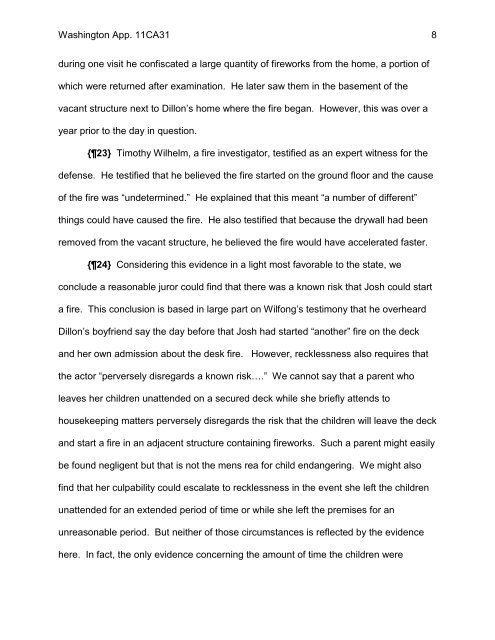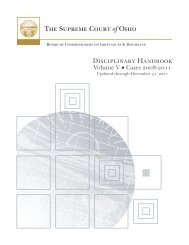State v. Dillon - Supreme Court - State of Ohio
State v. Dillon - Supreme Court - State of Ohio
State v. Dillon - Supreme Court - State of Ohio
You also want an ePaper? Increase the reach of your titles
YUMPU automatically turns print PDFs into web optimized ePapers that Google loves.
Washington App. 11CA31 8<br />
during one visit he confiscated a large quantity <strong>of</strong> fireworks from the home, a portion <strong>of</strong><br />
which were returned after examination. He later saw them in the basement <strong>of</strong> the<br />
vacant structure next to <strong>Dillon</strong>’s home where the fire began. However, this was over a<br />
year prior to the day in question.<br />
{23} Timothy Wilhelm, a fire investigator, testified as an expert witness for the<br />
defense. He testified that he believed the fire started on the ground floor and the cause<br />
<strong>of</strong> the fire was “undetermined.” He explained that this meant “a number <strong>of</strong> different”<br />
things could have caused the fire. He also testified that because the drywall had been<br />
removed from the vacant structure, he believed the fire would have accelerated faster.<br />
{24} Considering this evidence in a light most favorable to the state, we<br />
conclude a reasonable juror could find that there was a known risk that Josh could start<br />
a fire. This conclusion is based in large part on Wilfong’s testimony that he overheard<br />
<strong>Dillon</strong>’s boyfriend say the day before that Josh had started “another” fire on the deck<br />
and her own admission about the desk fire. However, recklessness also requires that<br />
the actor “perversely disregards a known risk….” We cannot say that a parent who<br />
leaves her children unattended on a secured deck while she briefly attends to<br />
housekeeping matters perversely disregards the risk that the children will leave the deck<br />
and start a fire in an adjacent structure containing fireworks. Such a parent might easily<br />
be found negligent but that is not the mens rea for child endangering. We might also<br />
find that her culpability could escalate to recklessness in the event she left the children<br />
unattended for an extended period <strong>of</strong> time or while she left the premises for an<br />
unreasonable period. But neither <strong>of</strong> those circumstances is reflected by the evidence<br />
here. In fact, the only evidence concerning the amount <strong>of</strong> time the children were
















